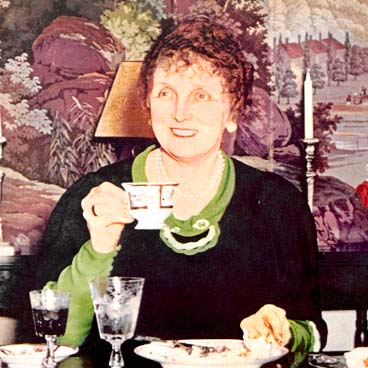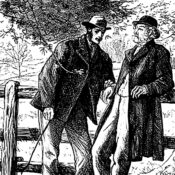Americans have always had trouble with their manners.
The problem isn’t that we’re less cultured than other countries (though many Europeans will gladly tell us how crude, loud, and insensitive we are.) No, our trouble is that we’re really not sure question: “What are good manners for?”
American manners resemble those of other western nations, but always with a more casual manner. We don’t bow to nobility, we don’t respect privilege, and we think ourselves the equals of anyone, which can seem barbaric to people from more tradition-bound nations.
Norman Vincent Peale identified three elements of good American manners in his 1975 Post article, “Courtesy: Key To A Happier World”:
“A strong sense of justice… courtesy often it nothing more than a highly developed sense of fair play…
“Another ingredient… is empathy, a quality that enables a person to see into the mind or heart of someone else, to understand the pain or unhappiness there and to do something to minimize it…
“Yet another component of politeness is the capacity to treat all people alike, regardless of status or importance.”
They’re all good principles, but they still require interpretation for each occasion. A further complication is our country’s highly fluid society, which is continually re-defining what is acceptable. Consider all the changes that emerged in the past generation. Within a few years, telling ethnic and sexist jokes fell from acceptable to taboo. The courtesies of offering and lighting cigarettes for others were suddenly unwelcome. Even the act of men opening doors for women could be misinterpreted.
In addition, society changes with every major technology. American developed new codes of behavior for railway travel, using a telephone, and driving automobiles. Today there is a new set of manners emerging for using cell phones, e-mail, or Facebook.
The constant change has produced a rewarding market for publishers of etiquette books. One of the most famous was “Emily Post’s Etiquette,” first published in 1922. The full title of the first edition was “Etiquette in Society, in Business, in Politics, and at Home.” It was an ambitious topic for any author, particularly the area of etiquette in politics, which I didn’t even know existed.
The book quickly made Emily Post the country’s leading authority on good manners. But 16 years later, Margaret Case Harriman noted how out-of-date the advice sounded:
“The bachelor girl can, on occasion, go out alone with any unmarried man she knows well, if the theater she goes to, or the restaurant she dines at, be of conventional character,” Mrs. Post’s book stated tranquilly in 1936. “The strict rules of etiquette demand that the divorced meet as total and unspeaking strangers” it set forth in another chapter, and “A lady having her portrait painted always takes a woman friend, or her maid, who sits in the studio, or at least within sight or hearing.”
And yet…
All over the country, bachelor girls were going out alone with unmarried men they knew only slightly, in the hope, perhaps, of getting to know them better; divorced people were greeting each other, when they met accidentally, with just as much kindliness as though they had never been married; and whatever ladies were having their portraits painted had very few women friends, or maids either, who were content to spend a whole afternoon just sitting within sight or hearing. But Mrs. Post pretty thoroughly ignored the modern trend.
The 1936 edition of Etiquette also contained an entire chapter devoted to the Chaperon, and, although she was, in fact, referred to as “the Vanishing Chaperon,” the reader could hear in those simple words an echo of the authors own wistfulness over the whole hellish situation.
In her Post article, “Dear Mrs. Post” [May 15, 1937], Ms. Harriman quickly dispelled the assumption that Emily Post was a fussy old maid, or a prim matriarch intent on ridding the world of bad posture, poor grammar, and vulgar table manners. In fact, Ms. Post had never sought to become the arbiter of propriety.
When the publishing firm of Funk & Wagnalls suggested that she write the book, she was skeptical; she disliked the word “etiquette” as being both fancy and phony, and she felt uncomfortable about setting herself up in print as an authority on correct social behavior, which was something she had always taken more or less idly for granted. [Editor] Richard Duffy pointed out that, although there were plenty of etiquette books on the market, none had been written by a woman of recognized social position… He followed up his argument by sending Mrs. Post all the current books about etiquette he could lay his hands on, and a few days later she telephoned him.
“These people,” she said, referring to the etiquette writers, “don’t seem to know what they’re talking about.”
“Well, you tell ‘em,” said Mr. Duffy simply.
Goaded, Mrs. Post sat down on a high stool at the architect’s drafting table she likes to write on and, in the next ten months, turned out 250,000 words on etiquette.
Emily Price had learned the rules of polite society by growing up in affluence and becoming a New York debutante.
She will tell you, with an air of mild astonishment, that nothing ever happened to her until she was nearly fifty, but that is not quite true. Things started happening to her more than thirty years ago, when she became a double-barreled pioneer in New York society by divorcing her husband in New York State—a pretty bold move at the time—and by going to work for a living. Nothing in her life up to that time had promised such unconventional goings-on and for a little while even her intimate friends were shaken to the core.
She was the first divorcee to combine her maiden name with that of her ex-husband; and it was as Mrs. Price Post that she went tot work, after the divorce was granted, to earn enough money to buy clothes for [sons] Ned and Bruce, and to educate them.
Emily Price Post was surprised as much by the success of her “Etiquette” as by the vast amount of misinformation on the subject reflected in readers’ letters.
When letters kept coming in, asking whether it was true that bread must be broken into pieces exactly one inch in diameter before it was eaten, and whether, when passing your plate for a second helping, you must hold your knife and fork in your hand, Mrs. Post began to realize that here, in this vast unsuspected throng of seekers after polite behavior, was her real public.
Almost all the letters from her readers are addressed to “Mrs. Emily Post,” which is incorrect. Her name on the flyleaf of Etiquette is followed by “Mrs. Price Post” in parentheses, but she realizes that to those readers of her column who haven’t bought the book, she is known by no other name than Emily Post. It still gives her a slight turn, however, to see “Mrs. Emily Post” on an envelope. She is not fussy about small matters of behavior, beyond the occasional mild recoil in the face of bad manners that is instinctive to any woman of taste, and she likes to think, and to impress upon her readers, that “etiquette” is a question of common sense and consideration rather than a study of how to speak to a visiting prince or eat an ear of corn on the cob. “No rule of etiquette is of less importance,” she has written patiently, time and time again, “than which fork we use.” And once, when she got fifteen letters in one day asking which fork the writers should use when confronted with several, she answered all fifteen grimly in four word: “Oh, use any one.”
When some of her conservative friends murmured that writing was a pleasant hobby for a woman of gentle birth, but that taking money for it seemed to them not a little crass, Emily Post pointed out that Mrs. Wharton was doing well in a literary way without noticeably losing caste, and that the Duer girls were still asked to decent people’s houses, although they gladly accepted pay for whatever they wrote whenever they could get it. The Duer girls were Alice, who later became Alice Duer Miller, and Caroline, who wrote a book of etiquette of her own a few years ago.
![]() Read “Dear Mrs. Post” by Margaret Case Harriman, published May 15, 1927.
Read “Dear Mrs. Post” by Margaret Case Harriman, published May 15, 1927.
Become a Saturday Evening Post member and enjoy unlimited access. Subscribe now




Comments
She married a wife cheating cad,
But tried to put up a false face,
For propriety must be had
In the perfect wife role and place.
Hubby’s affairs took a press course,
And she was forced to undergo
A nasty and public divorce.
But then she carried on as though
She was still the well mannered wife.
Her maid was like her chaperone,
At her side in her public life.
But at home she was all alone.
The name that still comes up the most
On etiquette – Emily Post.